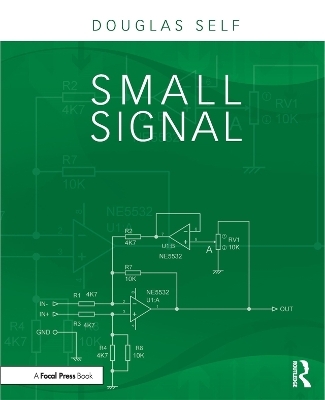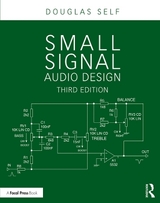
Small Signal Audio Design
Routledge (Verlag)
978-0-415-70973-6 (ISBN)
Learn to use inexpensive and readily available parts to obtain state-of-the-art performance in all the vital parameters of noise, distortion, crosstalk and so on. With ample coverage of preamplifiers and mixers and a new chapter on headphone amplifiers, this practical handbook provides an extensive repertoire of circuits that can be put together to make almost any type of audio system.
A resource packed full of valuable information, with virtually every page revealing nuggets of specialized knowledge not found elsewhere. Essential points of theory that bear on practical performance are lucidly and thoroughly explained, with the mathematics kept to a relative minimum. Douglas' background in design for manufacture ensures he keeps a wary eye on the cost of things. Includes a chapter on power-supplies, full of practical ways to keep both the ripple and the cost down, showing how to power everything.
Douglas wears his learning lightly, and this book features the engaging prose style familiar to readers of his other books. You will learn why mercury cables are not a good idea, the pitfalls of plating gold on copper, and what quotes from Star Trek have to do with PCB design.
Learn how to:
make amplifiers with apparently impossibly low noise
design discrete circuitry that can handle enormous signals with vanishingly low distortion
use humble low-gain transistors to make an amplifier with an input impedance of more than 50 Megohms
transform the performance of low-cost-opamps, how to make filters with very low noise and distortion
make incredibly accurate volume controls
make a huge variety of audio equalisers
make magnetic cartridge preamplifiers that have noise so low it is limited by basic physics
sum, switch, clip, compress, and route audio signals
The second edition is expanded throughout (with added information on new ADCs and DACs, microcontrollers, more coverage of discrete op amp design, and many other topics), and includes a completely new chapter on headphone amplifiers.
Douglas Self studied engineering at Cambridge University, then psychoacoustics at Sussex University. He has spent many years working at the top level of design in both the professional audio and hifi industries, and has taken out a number of patents in the field of audio technology. He currently acts as a consultant engineer in the field of audio design.
Introduction 1. Basics 2. Components 3. Designing with Discrete Transistors 4. Opamps and Their Properties 5. Filters 6. Preamplifier Architectures 7. Moving-Magnet Disc Inputs 8. Moving-Coil Disc Inputs 9. Volume-Control and Balance 10. Tone Controls and Equalisers 11. A Complete Preamplifier 12. Mixer Architectures 13. Microphone Input Amplifiers 14. Line Inputs 15. Line Outputs 16. Signal Switching 17. Mixer Subsystems 18. Level Indication and Metering 19. Level Control and Special Circuits 20. Power Supplies 21. Interfacing with the Digital Domain 22. Headphone Amplifiers
| Erscheint lt. Verlag | 1.10.2014 |
|---|---|
| Verlagsort | London |
| Sprache | englisch |
| Maße | 191 x 235 mm |
| Gewicht | 1338 g |
| Themenwelt | Mathematik / Informatik ► Informatik |
| Technik | |
| ISBN-10 | 0-415-70973-3 / 0415709733 |
| ISBN-13 | 978-0-415-70973-6 / 9780415709736 |
| Zustand | Neuware |
| Haben Sie eine Frage zum Produkt? |
aus dem Bereich



